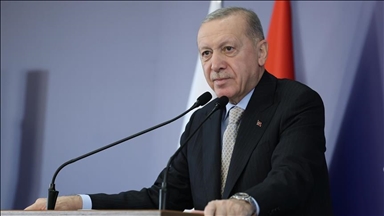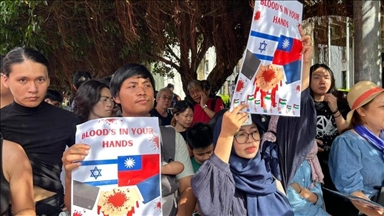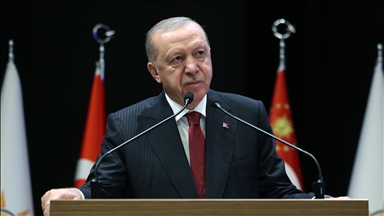2 years of genocide: Why some Asian nations still stand by Israel
Several Asia-Pacific nations maintain economic, labor, technological, agricultural ties with Israel despite their populations’ concerns about Palestine
 Taiwan
Taiwan
- Most smaller Asia-Pacific island nations tend to back Israel’s positions in UN votes
ISTANBUL
After nearly two years of war that has killed tens of thousands in Gaza and drawn accusations of genocide, Israel finds itself increasingly isolated on the world stage, with major powers suspending arms exports and recognizing Palestinian statehood.
In recent months, several Western countries, such as the UK, Spain, and Canada, have suspended arms exports to Israel. Meanwhile, the UK, Australia, and Canada have also recently recognized Palestinian statehood shortly before the UN General Assembly’s last meeting.
Israeli Prime Minister Benjamin Netanyahu recently acknowledged the pressure.
“We are entering a kind of isolation, and we will have to increasingly adjust to an economy with characteristics of self-sufficiency,” Netanyahu had said.
Yet, despite the mounting condemnation, a handful of smaller nations in Asia and the Pacific continue to stand by Tel Aviv.
South and Southeast Asia
Nepal was the first South Asian country to recognize Israel, establishing diplomatic relations on June 1, 1960. For decades, it was the only country in that region with diplomatic ties to Israel, though it has also supported a two-state solution.
“Back then, Nepal itself was struggling for wider international recognition,” Bishnu Pokharel, a former BBC journalist and analyst based in India, told Anadolu. “When Nepal decided to recognize Israel while supporting a two-state solution, it became international news, and Nepal – then a relatively unknown state – gained importance, especially among Western powers.”
The landlocked Himalayan nation does not recognize Palestine as an independent state. However, Nepal has generally not supported Israel in most UN forums and humanitarian issues, often voting against Tel Aviv or remaining neutral.
“Nepal’s diplomatic position has mainly been guided by the principle of non-alignment,” Pokharel said, noting that the country has “chosen to cooperate with Israel in certain areas, particularly in technology – mainly agriculture – foreign employment and military training.”
Labor migration has added another dimension.
“Nepal is a remittance-dependent country, and Israel is considered a highly paid job market compared to other Middle Eastern countries,” he said, adding that more than 5,000 Nepali caregivers are employed in Israel under a government-to-government arrangement.
“This economic and labor connection reinforces Nepal’s decision to maintain its historical ties with Israel,” he added.
Thailand has also maintained long-standing ties, with diplomatic relations established in 1954 and an Israeli embassy in Bangkok opened in 1958. While Bangkok officially recognized Palestine in 2012, it continues to cooperate closely with Israel, particularly in agriculture and education.
Every year, around 100,000 Israeli tourists travel to Thailand, and thousands of Thai workers, both skilled and unskilled, are employed in Israel. The country is also a popular destination for Thai students pursuing academic studies.
But according to Thai political analyst Wanwichit Boonprong, public opinion on the Gaza war differs from the government’s stance.
“The issue of Palestinian atrocities committed by the Israeli military is consistently covered on radio and TV,” he told Anadolu. “Thai society is uncomfortable and sympathetic to Muslim nations who want Thailand to take a global stand condemning Israeli violence against the Palestinians.”
However, he said the government is cautious.
“Public condemnation is not possible because the Thai government views this issue as sensitive and wants to maintain a balanced relationship with Israel,” he said.
Trade ties have remained strong, with bilateral commerce reaching $1.28 billion in 2024 and both governments expressing support for a free trade agreement in January 2025.
“Because Israel has provided military assistance and agricultural technology in the past, Thailand has tried to maintain neutrality on behalf of the government,” Boonprong added.
He said, however, that civil society has been “given a certain degree of freedom to express its concerns about Palestine.”
Taiwan, meanwhile, formally recognizes neither Israel nor Palestine but has maintained commercial ties with Tel Aviv since 1993 through an economic and trade office in Taipei. Cooperation is concentrated in technology, industry, and defense.
Pacific island nations
In the Pacific, a cluster of small island nations has become some of Israel’s most consistent supporters. Together, these small but strategically important states have provided Israel with a bloc of supportive voices in international forums, even as global criticism intensifies and more countries move to recognize Palestine.
Fiji, which first established relations with Israel in 1970, strengthened ties in September 2025 by opening a new embassy in Jerusalem. Days earlier, it abstained in a UN vote on a two-state solution. Like many of its neighbors, Fiji does not recognize Palestine.
Papua New Guinea, which forged diplomatic ties with Israel in 1978 soon after independence, followed a similar path. In September 2023, it also opened an embassy in Jerusalem and has since repeatedly opposed calls for a ceasefire at the UN. The country continues to reject recognition of Palestinian statehood.
Nauru, which established relations in 1994, has long been a loyal supporter. It recognized Jerusalem as Israel’s capital in 2019 and, in September this year, voted against a resolution backing a two-state solution.
Palau established ties in 1994, as did Micronesia in 1988. Both have consistently voted in line with Israel at the UN.
Samoa, which has had ties with Israel since 1972, signed a visa-waiver deal in 2019 but took a slightly different line in September, when it abstained in the two-state resolution. Still, like most of its neighbors, it has not extended recognition to Palestine.
Other Pacific nations such as Vanuatu, the Marshall Islands, Kiribati, the Solomon Islands, Tuvalu and Tonga maintain diplomatic relations with Israel, regularly support it in UN forums and likewise do not recognize Palestine.
Tonga and Israel signed a visa-waiver agreement in 2010, while Vanuatu and the Marshall Islands have consistently backed Israel in UN votes.
UN votes
At the United Nations, these voting patterns have been consistent. In three separate sessions – two in September and December of last year, and again on Sept. 12 this year – countries such as Palau, Papua New Guinea, Tonga, Micronesia and Nauru either voted against resolutions in support of Palestine, abstained, or stayed away from the ballot altogether.
Their positions have repeatedly placed them in a small minority siding with Israel, even as overwhelming majorities of UN member states back Palestinian rights.
There have, however, been exceptions.
Nepal, long maintaining ties with Israel but also voicing support for a two-state solution, joined the Solomon Islands and Thailand in voting for the latest General Assembly resolution, known as the New York Declaration, affirming support for an independent Palestinian state.
Still, such backing remains rare among Asia-Pacific states, where many of the smallest nations continue to stand firmly in Israel’s corner.
Anadolu Agency website contains only a portion of the news stories offered to subscribers in the AA News Broadcasting System (HAS), and in summarized form. Please contact us for subscription options.







